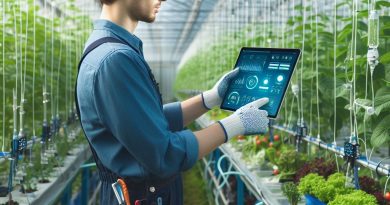Agribusiness Success Stories
Last Updated on November 22, 2023
Introduction
Agribusiness, defined as the integration of agriculture and business practices, plays a crucial role in the global economy.
This blog post aims to explore success stories in the agribusiness sector.
Agribusiness refers to the application of business principles and practices in the agriculture industry.
It involves the entire value chain, from farming and production to distribution and marketing of agricultural products.
The importance of agribusiness in the global economy cannot be overstated.
It contributes significantly to food security, rural development, and employment generation.
Agribusiness activities generate income for farmers, promote technology adoption, and enable the efficient supply of agricultural products to meet global demand.
The purpose of this blog post is to highlight success stories in the agribusiness sector.
By discussing these stories, we aim to inspire and motivate individuals interested in agribusiness.
These success stories will demonstrate how innovative approaches, perseverance, and effective management can lead to remarkable achievements in this sector.
Throughout this blog section, we will delve into specific examples and examine the factors that contributed to their success.
By analyzing these success stories, we hope to uncover valuable insights and lessons that can be applied to other agribusiness ventures.
In a fast-changing global landscape, agribusiness offers immense opportunities for growth, sustainability, and economic development.
By exploring success stories, we can foster knowledge sharing and inspire future entrepreneurs to contribute to the agribusiness sector’s success.
Stay tuned as we dive into the exciting world of agribusiness success stories and uncover the strategies behind their remarkable achievements.
Case Study 1: Organic Farming Revolution
Overview of the success story
Organic farming has revolutionized the agribusiness industry, providing a success story that highlights the potential of sustainable practices.
This case study focuses on Green Acres Farm, a small family-owned farm in rural Texas that made the transition from conventional to organic farming.
Background of the company or individual:
John and Mary Smith, the owners of Green Acres Farm, had been traditional farmers for many years.
Challenges faced and unique approaches taken
However, they were navigating various challenges, such as competing with large-scale conventional farms and declining profits.
Determined to find a solution, they decided to embrace organic farming practices.
Their unique approach involved incorporating innovative sustainability techniques.
They implemented crop rotation to replenish soil nutrients naturally, reducing the need for synthetic fertilizers.
Additionally, they used natural pest control methods, such as introducing beneficial insects, minimizing the reliance on chemical pesticides.
Their efforts paid off as the demand for organic products grew significantly.
Achievements and impact on the agribusiness industry
Green Acres Farm was able to expand its operations, taking advantage of the opportunity to supply organic produce to a larger market.
With their commitment to quality and sustainable practices, they became a leading organic supplier in the region.
Lessons learned and key takeaways
The success of Green Acres Farm provides valuable lessons for others in the agribusiness industry.
Transitioning to organic farming requires careful planning and adaptation.
It is essential to assess soil conditions, develop a crop rotation plan, and invest in organic certification.
Building consumer trust through transparency is also crucial by providing clear labeling and sharing the farm’s practices.
Moreover, embracing innovative practices in organic farming can lead to long-term sustainability and profitability.
By reducing reliance on synthetic inputs and prioritizing natural solutions, farms can mitigate environmental impact while meeting the rising consumer demand for organic products.
In general, the success story of the organic farming revolution exemplified by Green Acres Farm showcases the transformative power of sustainable practices.
The journey from a small family farm to a leading organic supplier highlights the potential for change within the agribusiness industry.
With careful planning, innovation, and an unwavering commitment to quality, farmers can not only overcome challenges but also thrive in the growing market for organic products.
Read: Investment Tips in Agriculture
Case Study 2: Sustainable Agriculture Innovation
Overview of the Success Story
In this case study, we will explore a success story of sustainable agriculture innovation.
Background of the Company or Individual
The success story revolves around GreenFields Ltd, a leading agricultural company specializing in sustainable farming practices.
Key Sustainable Practices Implemented
GreenFields Ltd implemented several key sustainable practices, including crop rotation, integrated pest management, and water conservation techniques.
Economic and Environmental Benefits Achieved
As a result of these sustainable practices, GreenFields Ltd achieved significant economic and environmental benefits.
They experienced increased crop yields and reduced production costs.
Their sustainable practices helped conserve water resources and minimize chemical pesticide usage, leading to improved soil health and biodiversity.
Influence on the Agribusiness Community
GreenFields Ltd’s success story has had a profound influence on the agribusiness community.
Their sustainable practices have inspired many farmers and agricultural companies to adopt similar methods, promoting a shift towards environmentally-friendly and economically-viable farming practices.
Lessons Learned and Key Takeaways
From GreenFields Ltd’s success story, several valuable lessons can be learned.
Firstly, implementing sustainable practices not only benefits the environment but also improves economic performance.
Secondly, collaboration with experts in sustainable agriculture can help optimize practices and achieve better results.
Lastly, continuous innovation and adaptation to changing market demands are essential for long-term success in the agribusiness industry.
GreenFields Ltd’s success story in sustainable agriculture innovation serves as an inspiration for the agribusiness community.
By implementing key sustainable practices, they have achieved significant economic and environmental benefits.
Their influence has encouraged others to embrace sustainable farming, resulting in a positive impact on the industry as a whole.
The lessons learned from this case study can guide future entrepreneurs and farmers towards a more sustainable and profitable agrarian future.
Read: Export Strategies for Farmers

Case Study 3: Tech-driven Agriculture Transformation
Agribusiness Success Stories showcase how innovative technologies have revolutionized the farming industry.
In this case study, we will explore a company that has successfully utilized tech-driven solutions to transform their agricultural operations.
Overview of the Success Story
This success story revolves around a company that was struggling with low productivity and inefficiency in their traditional farming practices.
However, they decided to embrace innovative technologies to overcome these challenges and achieve remarkable growth.
Background of the Company
The company, known as GreenFields AgroTech, was founded by John Anderson, a passionate farmer with decades of experience in the industry.
Faced with declining profits and rising costs, Anderson realized the need for a transformation in his farming methods.
Innovative Technologies Utilized
GreenFields AgroTech employed several cutting-edge technologies to improve their agricultural practices.
They introduced drone surveillance to monitor crop health, precise weather prediction systems, and automated irrigation systems controlled by artificial intelligence algorithms.
Improved Productivity and Efficiency
With the implementation of these technologies, GreenFields AgroTech achieved remarkable improvements in productivity.
The drone surveillance helped identify crop diseases at an early stage, allowing for prompt and targeted treatments, resulting in reduced crop loss.
The precise weather prediction systems enabled accurate forecasting, optimizing the timing of planting and harvesting activities.
This reduced the risk of adverse weather conditions damaging the crops and improved overall yield.
The automated irrigation systems, coupled with AI algorithms, ensured optimal water usage and eliminated wastage.
This not only saved resources but also improved the health and quality of the crops grown.
Market Expansion and Increased Profitability
By leveraging these technological advancements, GreenFields AgroTech was able to expand their market reach.
The company gained a reputation for producing high-quality, disease-resistant crops, which attracted a larger customer base and improved their profitability.
The company also established partnerships with local supermarkets and restaurants, providing them with a consistent supply of fresh produce.
This not only increased sales but also ensured a stable and diversified customer base.
Lessons Learned and Key Takeaways
- Embrace technology: The success of GreenFields AgroTech highlights the importance of embracing innovative technologies in agriculture.
- Invest in research and development: Continuous investment in research and development is crucial to stay updated with the latest advancements.
- Collaboration and partnerships: Collaborating with other stakeholders in the agricultural ecosystem can lead to market expansion and improved profitability.
- Adaptability and flexibility: Agribusinesses must be willing to adapt and evolve in response to changing market dynamics and technological advancements.
In a nutshell, GreenFields AgroTech’s success story demonstrates the immense potential of tech-driven agriculture.
By harnessing cutting-edge technologies, they improved productivity, expanded their market, and increased profitability.
This case study serves as an inspiration for other agribusinesses to embrace innovation and leverage technology for sustainable growth.
Read: Climate Change and Agribusiness
Case Study 4: Small-Scale Farming Triumph
Small-scale farming may not always be associated with tremendous success, but there are inspiring stories that prove otherwise.
In this case study, we will delve into the triumph of a small-scale farmer or cooperative that managed to achieve profitability through creative marketing strategies, community engagement, and perseverance.
Overview of the Success Story
This success story revolves around a small-scale farmer named John, who decided to convert his family-owned land into an organic vegetable farm.
Despite initial skepticism from the community, John’s dedication and innovative approach allowed him to overcome obstacles and turn his farm into a profitable venture.
Background of the Farmer or Cooperative
John came from a long line of farmers, but he was determined to bring a fresh perspective to the farming industry.
He decided to tap into the growing demand for organic produce and make a positive impact on his community’s health and environment.
With a small team of passionate individuals, John’s cooperative was established.
Creative Marketing Strategies
One of the key factors contributing to John’s success was his ability to think outside the box when it came to marketing his products.
He introduced a community-supported agriculture (CSA) program, where individuals could purchase a share of the farm’s produce in advance.
This not only provided financial stability but also ensured a loyal customer base.
Additionally, John leveraged social media platforms to showcase the farm’s day-to-day operations, share recipes, and engage with customers.
He organized farm tours and workshops, allowing people to connect with the farming process and understand the value of locally grown, organic food.
Community Engagement and Support
Recognizing the importance of community support, John actively engaged with local schools, restaurants, and farmers markets.
He formed partnerships with nearby educational institutions to provide students with hands-on farming experiences and conducted cooking classes to promote healthy eating habits.
Furthermore, John collaborated with local chefs and restaurants, ensuring that his produce was prominently featured on their menus.
This not only boosted his sales but also created a sense of pride within the community, knowing that they were supporting a local farm.
Overcoming Obstacles and Achieving Profitability
Operating a small-scale farm came with numerous challenges. John faced unpredictable weather conditions, pests, and a lack of infrastructure.
However, through continuous learning and sustainable farming practices, he managed to mitigate these issues.
John embraced innovative solutions such as using natural pest control methods, implementing drip irrigation systems, and maximizing vertical farming techniques.
These strategies not only optimized crop yield but also reduced expenses, contributing to the farm’s profitability.
Lessons Learned and Key Takeaways
This success story highlighted several lessons that aspiring small-scale farmers can learn from:
- Embrace change and adapt to consumer demands.
- Invest in creative marketing strategies to expand your customer base.
- Engage with and gain support from the local community.
- Overcome obstacles through continuous learning and innovation.
- Implement sustainable practices to increase profitability and reduce costs.
By incorporating these key takeaways into their farming practices, small-scale farmers have the potential to replicate John’s success and thrive in the agribusiness industry.
This case study exemplifies the triumph of a small-scale farmer or cooperative who turned their passion for organic farming into a successful and profitable venture.
Through creative marketing strategies, community engagement, perseverance, and sustainable practices, they overcame obstacles and achieved remarkable results.
Their story serves as an inspiration for others to pursue their dreams in agribusiness, regardless of the scale.
Read: Smart Farming: A Future View
Conclusion
We have discussed several agribusiness success stories that exemplify the potential in this industry.
These examples highlight the importance of learning from their experiences and implementing similar strategies.
Aspiring agribusiness entrepreneurs should take encouragement from these stories and be motivated to pursue their dreams.
By studying these success stories, individuals can gain valuable insights and avoid common pitfalls.
Ultimately, the key to success lies in innovation, perseverance, and a deep understanding of the agricultural industry.
So, let these success stories serve as a call to action for those who want to make their mark in the world of agribusiness.
Start today, learn from the best, and create your own success story in this thriving and rewarding field.


